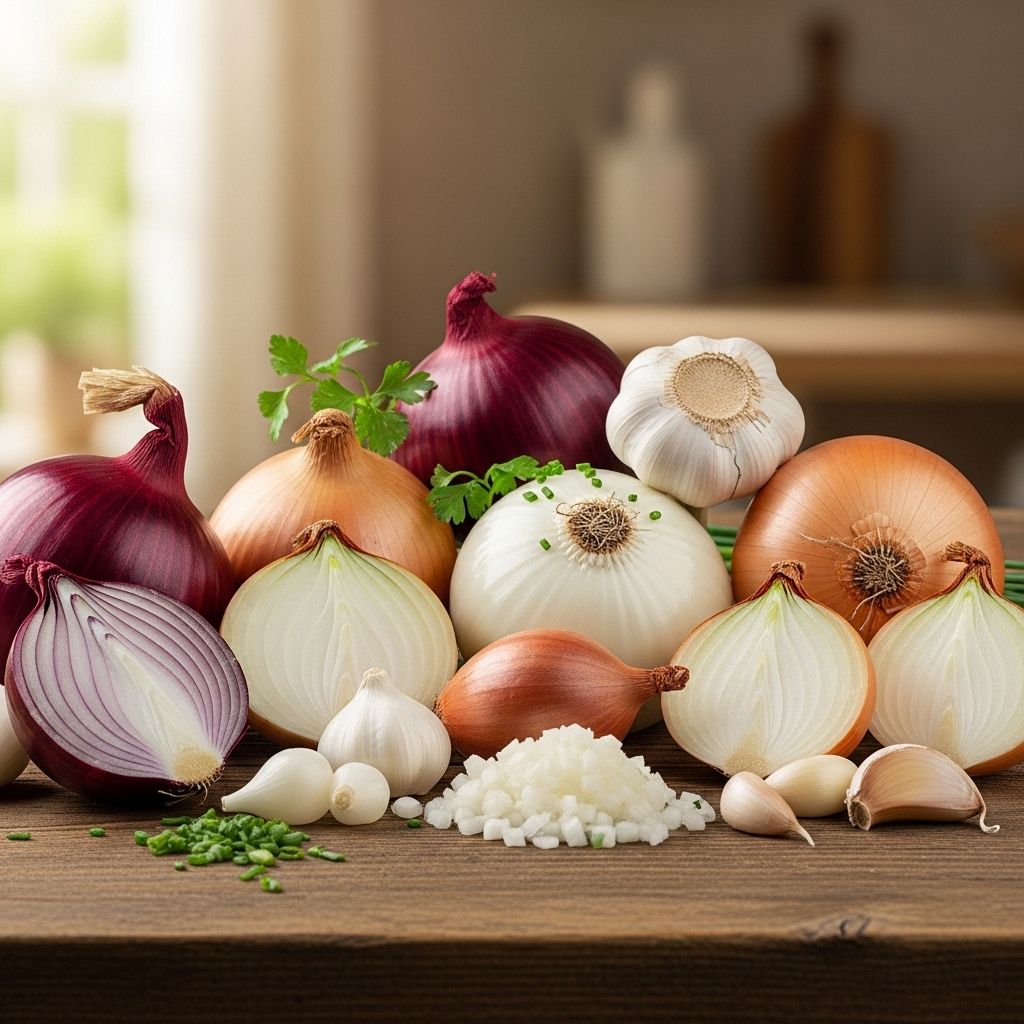15 Surprising Health Benefits Of Onions You Should Know
Antioxidant-packed everyday produce that promotes circulation and aids digestion.

Onions are a staple ingredient in kitchens around the world, renowned not only for their bold flavor but also their impressive nutrition profile and health-promoting properties. This humble vegetable offers a wealth of benefits, making it a powerful addition to your daily diet. Here, we explore 15 science-backed benefits of onions, their nutritional content, medicinal uses, potential side effects, and answers to your burning questions about this versatile vegetable.
Nutritional Profile Of Onions
| Nutrient | Amount per 100g |
|---|---|
| Calories | 40 kcal |
| Protein | 1.1 g |
| Carbohydrates | 9.3 g |
| Fiber | 1.7 g |
| Vitamin C | 7.4 mg |
| Potassium | 146 mg |
| Folate | 19 µg |
| Sulfur compounds | Variable |
| Quercetin | 20-50 mg |
Onions are low in calories and rich in vitamins, minerals, and antioxidants, most notably quercetin and sulfur compounds that contribute to their unique health benefits.
1. Supports Heart Health
Onions are packed with antioxidants and sulfur compounds that may reduce cholesterol levels, lower blood pressure, and decrease the risks of heart disease. The prominent antioxidant quercetin helps prevent blood clot formation and improves vascular function.
- May reduce levels of LDL (“bad”) cholesterol.
- Possesses blood-thinning properties beneficial for heart health.
- Antioxidants in onions help fight inflammation, contributing to improved cardiovascular function.
2. Promotes Bone Strength
Consuming onions may improve bone density and lower the rate of bone loss, especially in postmenopausal women. Studies suggest that regular onion intake contributes to stronger bones and decreased risk of osteoporosis.
- Onions help the body retain more calcium, supporting overall bone health.
- Quercetin and other antioxidants combat oxidative stress responsible for bone weakening.
3. Enhances Digestive Health
Onions are rich in prebiotic fibers—including inulin and fructooligosaccharides—which fuel beneficial gut bacteria, enhance digestion, and support a balanced microbiome.
- Prebiotics feed good gut bacteria for improved digestion.
- Helps prevent constipation and supports bowel regularity.
4. Regulates Blood Sugar Levels
The flavonoids and sulfur compounds in onions can help maintain steady blood sugar levels, making them especially beneficial for people with diabetes or at risk of developing diabetes.
- Onion extract may lower fasting blood sugar levels.
- Quercetin improves insulin sensitivity and glucose metabolism.
5. Loaded With Antioxidants
Onions contain a variety of antioxidants, most notably quercetin, which protect cells against damage and reduce chronic inflammation.
- Neutralizes free radicals responsible for aging and disease.
- May decrease overall risk of chronic conditions.
6. Possesses Anticancer Properties
Sulfur-containing compounds and flavonoids found in onions may help slow or stop the growth of certain cancer cell types. Population studies suggest that regular consumption of onions is linked to a lower risk of cancers—such as stomach, colorectal, and prostate.
- Sulfur compounds help detoxify carcinogens in the body.
- Quercetin inhibits tumor cell proliferation in lab studies.
7. Improves Immune System Function
Onions are a good source of vitamin C and other phytochemicals that boost immune response, protect against common illnesses, and aid healing.
- Vitamin C enhances the body’s defense against pathogens.
- Antioxidants reduce chronic inflammation and infection risk.
8. Facilitates Weight Loss
Onions are low in calories, high in fiber, and contain quercetin, all of which help with satiety and weight management. Their fiber content makes you feel fuller for longer, reducing overall calorie intake.
- 1 cup of chopped onion provides just 64 kcal with 3g fiber.
- Quercetin demonstrates anti-obesity effects.
- Onion juice or raw onions are effective ways to incorporate them into a weight loss diet.
9. Antibacterial Effects
Onions contain plant compounds that may inhibit the growth of bacteria—including dangerous species like E. coli and Staphylococcus aureus. Research suggests that quercetin and sulfur compounds slow or halt bacterial proliferation.
- Natural antibacterial properties support oral and digestive health.
- Helps protect against foodborne and respiratory illnesses.
10. Eases Respiratory Issues & Nasal Congestion
The anti-inflammatory and immune-modulating actions of onions are beneficial for respiratory health. Onion extract has shown potential in clearing nasal congestion and reducing asthma symptoms.
- Quercetin and sulfur compounds open airways and reduce inflammation.
- May alleviate symptoms of bronchitis and allergic rhinitis.
11. May Benefit Sleep Quality
The prebiotics present in onions not only improve gut health but may also enhance sleep quality and reduce stress.
- Promotes production of sleep-enhancing neurotransmitters.
- Regular intake may lead to deeper, restorative sleep.
12. Strengthens Hair And Skin
Onions contain allium and sulfur compounds that may promote hair growth and improve skin tone. Onion juice is a traditional remedy for hair loss and dandruff.
- Onion extract stimulates collagen production for healthy skin.
- Sulfur boosts hair thickness and volume.
13. Easy To Add To Your Diet
Onions are highly versatile and can be prepared in countless ways: raw in salads, cooked in stews and curries, or even juiced for concentrated benefits.
- Add sliced onions to sandwiches, wraps, and salads.
- Use them in soups, sauces, and stir-fries.
- Enjoy pickled onions as a tangy side dish.
14. Increases Nutrient Absorption
Onions can enhance the absorption of certain nutrients—such as iron and zinc—from other foods when eaten together.
- Improves bioavailability of micronutrients for overall health.
- Pair with iron-rich foods to boost absorption.
15. Helps Reduce Risk Of Chronic Disease
Long-term onion consumption is associated with lower incidence of chronic diseases—including type 2 diabetes, cancer, and cardiovascular disorders—thanks to its potent antioxidant and anti-inflammatory actions.
- May lower risk of stroke, heart attack, and metabolic syndrome.
- Protects cells from oxidative damage over time.
Types Of Onions And Their Health Impacts
- Red Onions: Highest quercetin content and potent antioxidants.
- Yellow Onions: Common in cooking, good source of flavonoids.
- White Onions: Milder flavor with digestive benefits.
- Shallots: Rich in polyphenols and vitamins.
Precautions And Side Effects
- Excessive consumption can cause gastric irritation and heartburn.
- Onions sometimes lead to bad breath; brushing teeth or chewing mint helps.
- May trigger allergic reactions in rare cases (typically skin rashes or digestive upset).
- Consult a healthcare professional before increasing intake if you have digestive sensitivities.
Medicinal Uses Of Onions
- Treating cough and cold: Onion juice mixed with honey is a classic remedy.
- Managing hair fall: Onion extract helps stimulate hair follicles.
- Skin infection relief: Fresh onion poultices may aid minor wounds and blemishes.
- Blood sugar control: Used traditionally to regulate diabetes symptoms.
Tips For Using Onions
- Choose firm, dry onions free from spots or mold.
- Store in a cool, dry, ventilated area to prolong freshness.
- Peel and slice just before use to preserve antioxidant levels.
- Cooking gently may conserve quercetin and vitamin C content.
Frequently Asked Questions (FAQs)
Q: How many onions should you eat daily for health benefits?
A: 1 medium onion per day is generally safe and can provide most health benefits. However, always listen to your body’s reaction and consult a nutritionist for personalized advice.
Q: Is eating raw onion better than cooked?
A: Raw onions retain higher concentrations of flavonoids and vitamin C, but both raw and cooked onions are nutritious. Cooking can enhance digestibility and flavor.
Q: Can onions help with weight loss?
A: Yes. Onions are low in calories, high in fiber, and contain quercetin, which together assist in reducing hunger and enhancing metabolism.
Q: Are onions safe for people with diabetes?
A: Yes. Onion extracts have shown potential to regulate blood glucose and improve insulin sensitivity. However, monitor portion size and consult your health provider.
Q: Do onions cause bad breath?
A: Onions can cause temporary bad breath due to sulfur compounds. Good oral hygiene and chewing mint can help alleviate breath odor.
Q: Are there benefits to using onion juice?
A: Onion juice is believed to stimulate hair growth, soothe skin, and regulate blood sugar, but more research is needed for definitive recommendations.
Conclusion
Onions are much more than a culinary staple. Their impressive nutritional profile and broad range of health benefits—from boosting heart health and bone density to aiding immunity and digestion—make them a true superfood. Adding a variety of onions to your meals can be a simple, tasty, and effective way to improve your health naturally. Remember to enjoy onions as part of a balanced diet and healthy lifestyle for optimal results, and consult experts if you have specific health concerns.
References
- https://www.stylecraze.com/articles/effective-ways-to-use-onion-for-weight-loss/
- https://www.youtube.com/watch?v=np_jjA9Xji4
- https://health.clevelandclinic.org/are-onions-good-for-you
- https://www.healthline.com/nutrition/onion-benefits
- https://www.onions-usa.org/onionista/8-impressive-health-benefits-of-onions/
- https://pmc.ncbi.nlm.nih.gov/articles/PMC10420769/
- https://spiceworldinc.com/health/10-health-benefits-of-onions/
- https://embracingspirituality.wordpress.com/2014/11/17/the-benefits-of-onion-shared-by-mth/
Read full bio of Sneha Tete












